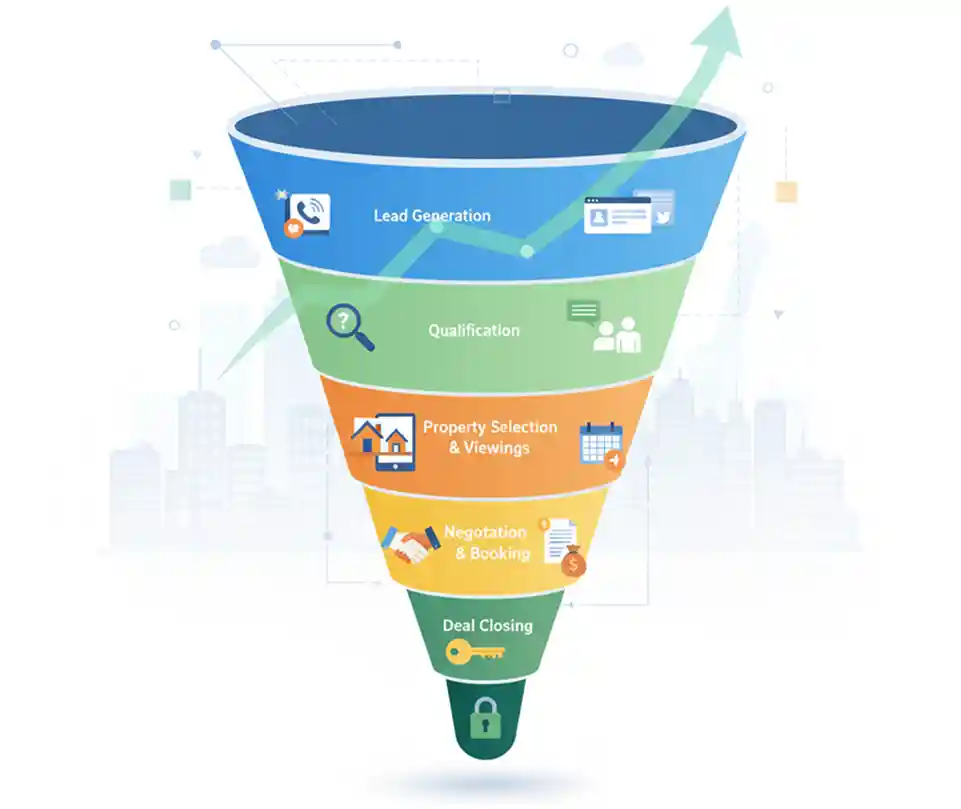_11zon.webp)
2025-11-18
The modern real estate market demands speed, accuracy, and impeccable data management. For real estate agencies, developers, and brokers, a CRM system is no longer a luxury but a necessary tool for survival and growth.
A specialized Real Estate CRM helps not just to store contacts, but also to automate the entire deal lifecycle—from the first inquiry to contract signing and subsequent property management. Let's look at the key ways a CRM optimizes agency operations.
1. Data Centralization and Lead Management
The main headache for any agency is scattered data, spread across spreadsheets and notebooks. An effective CRM system solves this problem by creating a unified digital ecosystem:
- Property Catalogue: All properties (apartments, houses, commercial spaces) are stored in a single, easily accessible database with photos, statuses, documents, and notes. Agents can easily filter and find the right option, saving the client's time.
- Inquiry Processing (Leads): The system automatically collects inquiries from all channels (website, forms, telephony) and registers them in the CRM. This ensures a quick response and minimizes the loss of potential clients due to human error.
- Owner Database: The CRM allows you to create and maintain a complete database of property owners with interaction history. This simplifies the process of repeat contact and securing new contracts for sales or rentals.
2. Increasing Agent Efficiency and KPI Control
The CRM is a powerful staff management tool that ensures transparency and boosts productivity:
- Activity Monitoring: Managers can track agent activity in real-time, view their key performance indicators (KPIs), the number of inquiries processed, and conversion rates at each stage of the sales pipeline.
- Process Transparency: Thanks to a centralized dashboard, every agent has a clear understanding of their priority tasks and deal statuses, eliminating work duplication or forgotten leads.
- Flexible Access Rights: The ability to configure which data each employee can view and edit ensures the security of confidential information and prevents client base leakage.
3. Automation of Rental Management and Financial Reporting
For agencies that also engage in property management or rentals, the CRM offers critically important automation functions:
- Tenant Management: Specialized functionality allows you to manage active contracts, track payment schedules, automatically send reminders, and maintain a complete history of tenant relationships.
- Reporting: Automated reports provide deep data analysis on revenue, property effectiveness, and agent productivity, enabling informed strategic decisions about business development.
???? Comprehensive Solution: Real Estate CRM Plugin
To achieve maximum efficiency, it is worth choosing solutions that have been created with the specifics of the real estate market in mind.
For example, a tool like the Real Estate CRM Plugin (Real Estate Module) from Confidence Technology allows agencies and developers to implement all the listed functions: from managing owners and branches to automated tenant and inquiry management.
- Learn more about the benefits and features of this specialized CRM solution here:
Real Estate CRM Plugin - Property Management & Automation Tool
???? Conclusion
Implementing a real estate CRM system is not an expense, but a strategic investment. It not only optimizes the agency's daily work by ensuring data order and increasing staff efficiency, but it also guarantees that no valuable lead or important payment is lost. This, ultimately, leads to stable sales growth, increased profits, and the sustainability of your business in a highly competitive market.
Recent post
Tagscloud
Subscribe our weekly subscription
Add some text to explain benefits of subscripton on your services. We'll send you the best of our blog just once a weekly.

